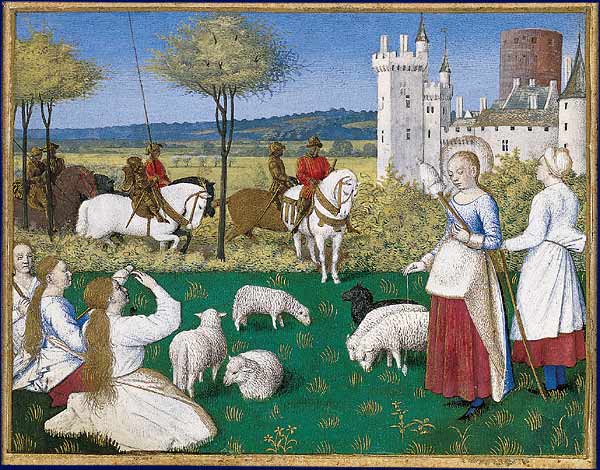Shepherdess Saints and Sinister Seigneurs: The Social History of a Local/Global Cult
- 22/03/2022
- 18:00-19:30
- Online talk

Image credit: 'Sainte Marguerite et Olibrius,' [detail], from Jean Fouquet, Heures d'Etienne Chevalier, ms; Paris, musée du Louvre, département des Miniatures et Enluminures, M. I. 1093. Photo RMN; http://expositions.bnf.fr/fouquet/grand/f122.htm. Public domain: https://commons.wikimedia.org/w/index.php?curid=208348
Shepherdess Saints and Sinister Seigneurs: The Social History of a Local/Global Cult
Online talk by Prof. David Hopkin (University of Oxford)
Tuesday 22 March 2022, 18:00-19:30 GMT
All over Europe, rural communities honour shepherdesses, as saints, murdered by lords. What does this cult reveal about social relations?
Every third Sunday in July, pilgrims gather at the chapel of Saint Elidie in the Auvergne. There are several versions of her legend, but the popular tale goes roughly like this: the lustful lord of Poulargues desired the shepherdess Elidie. She hid in the woods where her dog brought her food, but she was betrayed by neighbours. Fleeing from the lord and his huntsmen, Elidie was transformed into a deer. When her head was cut off, she carried it to a spring where her blood is still visible and miracles are performed. The lord, full of remorse, built her a tomb. Locals consider Elidie a saint; her tomb and spring are religious sites.
While Saint Elidie is otherwise unknown in the Catholic Church, hers is not only a local cult, because almost every region of France has its own shepherdess saint, martyred by her feudal lord: Saint Espérie, Saint Néomaye, Saint Saturnine, Saint Solange, Saint Verge, Saint Reine… The details of her tribulations and death vary, but the main thread of the legend remains the same. Such saints proliferate in France, but there are related cults of shepherdess saints in other parts of Europe, such as Saint Marina in Galicia and Saint Gemma in the Abruzzi, and all of them have some kind of relationship with Saint Margaret of Antioch. My aim in this talk is to explore what martyred shepherdess saints meant to the people who told her story, honoured her relics, and celebrated her feast. Feudal/seigneurial relationships shaped life in the European countryside until the French Revolution, and in practice long after: saints’ legends were one way in which the history and memory of feudalism was transmitted in oral culture.
Tickets: £5.00 (£3.00 for Folklore Society members with the Promo Code: log in to the Members Only area to get the Promo Code, and don’t forget to click ‘Apply‘)
Book via Eventbrite: https://www.eventbrite.co.uk/e/shepherdess-saints-and-sinister-seigneurs-tickets-244557838077